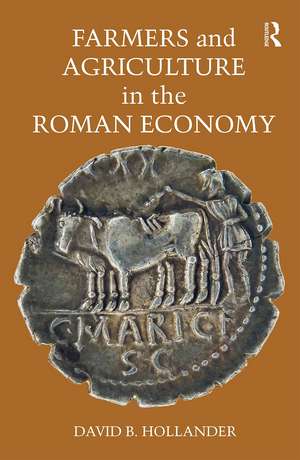Farmers and Agriculture in the Roman Economy
Autor David B. Hollanderen Limba Engleză Paperback – 30 sep 2020
Preț: 379.22 lei
Nou
Puncte Express: 569
Preț estimativ în valută:
72.56€ • 79.07$ • 61.15£
72.56€ • 79.07$ • 61.15£
Carte tipărită la comandă
Livrare economică 23 aprilie-07 mai
Preluare comenzi: 021 569.72.76
Specificații
ISBN-13: 9780367666224
ISBN-10: 0367666227
Pagini: 142
Dimensiuni: 156 x 234 x 14 mm
Greutate: 0.21 kg
Ediția:1
Editura: Taylor & Francis
Colecția Routledge
Locul publicării:Oxford, United Kingdom
ISBN-10: 0367666227
Pagini: 142
Dimensiuni: 156 x 234 x 14 mm
Greutate: 0.21 kg
Ediția:1
Editura: Taylor & Francis
Colecția Routledge
Locul publicării:Oxford, United Kingdom
Public țintă
PostgraduateCuprins
Contents;Acknowledgements;1. Problems and Sources;1.1 Introduction;;1.2 The Problem with Self-Sufficiency;1.3 Sources for Roman Agriculture;1.3.1 Cato’s De agri cultura;1.3.2 Varro’s De re rustica;1.3.3 Columella’s De re rustica;1.3.4 Pliny the Elder’s Natural History;1.3.5 Archaeology;1.3.6 Art;1.4 Conclusion;2. The Parameters of Roman Agriculture;2.1 Introduction;2.2 Climate & Geography;2.3 Demography;2.4 Roman Crops;2.4.1 Cereals;2.4.2 Viticulture;2.4.3 Olives;2.4.4 Other Fruit Trees;2.4.5 Legumes (AKA Pulses);2.4.6 Fiber Crops;2.4.7 Nuts;2.4.8 Vegetables and Tubers;2.4.9 Other Plants;;2.5 Livestock;2.6 Conclusion;3. Buyers and Borrowers: the Rural Demand for Goods, Services, and Money;3.1 Introduction;3.2 Start-up Requirements;3.2.1 Building supplies;3.2.2 Metal agricultural tools;3.2.3 Wooden Tools;3.2.5 Storage;3.2.6 Clothing;3.2.7 Processing Equipment;3.2.8 Other Equipment;3.3 Seasonal Requirements;3.4 Maintenance Requirements;3.5 Extra-agricultural Expenses;3.6 Borrowing and Sharing;3.7 Rural Demand for Coinage;3.8 Conclusion;4. Vendors and Lenders: the Rural Supply of Goods and Services;4.1 Introduction;4.2 Animals and Animal Byproducts;4.2.1 Meat;4.2.2 Wool;4.2.3 Dairy Products;4.2.4 Apiculture;4.3 The Profitability of Plants;4.3.1 Grain;4.3.2 Viticulture;4.3.3 Olive Oil;4.3.4 Flowers;4.3.5 Vegetables;4.3.6 Other Produce;4.3.7 Linen;4.4 The Sale of the Superfluous;4.5 Working for Others;4.6 Moneylending;4.7 Conclusion;5. Farmers’ Markets, Farmers’ Networks;5.1 Introduction;5.2 Markets;5.3 Reciprocity;5.4 Redistribution;6. Farmers in Roman Economic History;6.1 Introduction;6.2 Degrees of Market Dependency;6.2.1 Elite Farmers;6.2.2 Moderately Wealthy Farmers;6.2.3 Smallholders;6.2.4 Landless Farmers;6.3 Farmers in the Roman Economy;6.3.1 The Second Century bce;6.3.2 The First Century bce Prior to the Reign of Augustus;6.3.3 The Early Empire;Bibliography; Index
Notă biografică
David B. Hollander earned a PhD in Ancient History from Columbia University (2002). He published his monograph Money in the Late Roman Republic in 2007 and served as the economy editor for The Encyclopedia of Ancient History (2012). He is an associate professor in the History Department at Iowa State University, USA.
Recenzii
"The merit of this book is to propose a global vision, over a large period of time, of the economic behaviour of these almost "mute" people that the Roman peasants are for us today."
- Maëlys Blandenet, ENS de Lyon, France, Bryn Mawr Classical Review 2019
- Maëlys Blandenet, ENS de Lyon, France, Bryn Mawr Classical Review 2019
Descriere
This monograph uses literary, archaeological, and comparative evidence to examine how farmers - from smallholders to the owners of large estates -bought and sold goods and services, lent and borrowed money, and cooperated or competed with one another.
